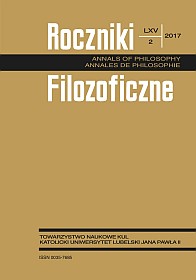Content Analysis of the Demonstration of the Existence of God Proposed by Leibniz in 1666
Abstract
Leibniz’s juvenile work De arte combinatoria of 1666 included the “Proof for the Existence of God.” This proof bears a mathematical character and is constructed in line with Euclid’s pattern. I attempted to logically formalize it in 1982. In this text, on the basis of then analysis and the contents of the proof, I seek to show what concept of substance Leibniz used on behalf of the proof. Besides, Leibnizian conception of the whole and part as well as Leibniz’s definitional method have been reconstructed here.
References
Aiton, Eric J. Leibniz: A Biography. Bristol & Boston: A. Hilger Ltd., 1985.
Antognazza, Maria Rosa. Leibniz: An Intellectual Biography. New York: Cambridge University Press, 2009.
Burkhardt, Hans. Logik und Semiotik in der Philosophie von Leibniz. München: Philosophia Verlag, 1980.
Dummett, Michael. “N. Rescher’s Leibniz’s Interpretation… Review.” Journal of Symbolic Logic 21 (1956): 197–199.
Garber, Daniel. Leibniz: Body, Substance, Monad. Oxford: Oxford University Press, 2010.
Grzegorczyk, Andrzej. “The Systems of Leśniewski in Relation to Contemporary Logical Research.” Studia Logica 3 (1955): 91–95.
Kauppi, Raili. Über die Leibnizsche Logik. Helsinki: Societas Philosophica, 1960.
[Krauze-]Błachowicz, Krystyna. “Leibniz’s ‘Demonstratio Existentiae Dei ad mathematicam certitudinem exacta.’ A logical Analysis.” Studies in Logic, Grammar and Rhetoric 2 (1982): 43–55.
Krauze-Błachowicz, Krystyna. “‘Archai’. Problem rozumienia pierwszych zasad w systemie Euklidesa.” Idea. Studia nad strukturą i rozwojem pojęć filozoficznych 1 (1986): 8-17.
Krauze-Błachowicz, Krystyna. “Early Greek Mathematics—a Branch of Dialectic?” Studies in Logic, Grammar and Rhetoric 5 (1986): 5–20.
Krauze-Błachowicz, Krystyna. Leibniz. Wczesne pojęcie substancji. Białystok: Zakład Teorii Poznania. Filia Uniwersytetu Warszawskiego, 1992.
Marciszewski, Witold. Metody analizy tekstu naukowego. Warszawa: PWN, 1977.
Marciszewski, Witold. “On Leibniz’ Anticipation of the Comprehension Axiom in the Light of the Formalization of ‘Demonstratio Existentiae Dei’.” Studies in Logic, Grammar and Rhetoric 2 (1982): 29–42.
Mercer, Christia. “The Vitality and Importance of Early Modern Aristotelianism.” In The Rise of Modern Philosophy, edited by Tom Sorell, 33-67. Oxford: Clarendon Press, 1993.
Mercer, Christia. The Young Leibniz and his Teachers. In The Young Leibniz and his Philosophy 1646–76, edited by Stuart Brown, 19-40. Dordrecht, Boston, Leiden: Kluwer Academic Press, 1999.
Mercer, Christia. Leibniz’s Metaphysics: Its Origins and Development. New York: Cambridge University Press, 2001.
Moll, Konrad. Der Junge Leibniz. T. I–II. Stuttgart-Bad Cannstatt: Frommann-Holzboog, 1978–1982.
Pawłowski, Tadeusz. Tworzenie pojęć w naukach humanistycznych, Warszawa: PWN, 1986.
Rescher, Nicholas. “Leibniz’s Interpretation of his Logical Calculi.” Journal of Symbolic Logic 19 (1954): 1–20.
Rickey, V. Frederick. “A Survey of Leśniewski’s Logic.” Studia Logica 36 (1977): 405–422.
Voisé, Waldemar. “Erhard Weigel (1625-1699) czyli u progu Wieku Oświecenia (z okazji 300 rocznicy jego książki Idea Matheseos Universae).” Kwartalnik Historii Nauki i Techniki 15 (1970), 3: 527–544.
Copyright (c) 2017 Roczniki Filozoficzne

This work is licensed under a Creative Commons Attribution-NonCommercial-NoDerivatives 4.0 International License.





